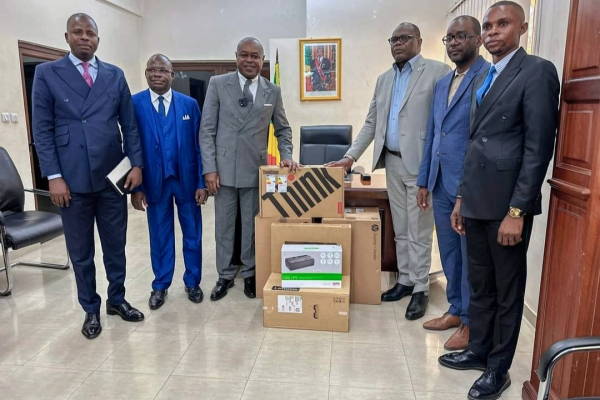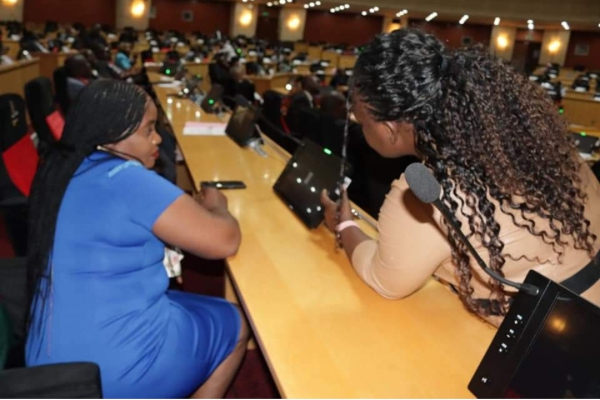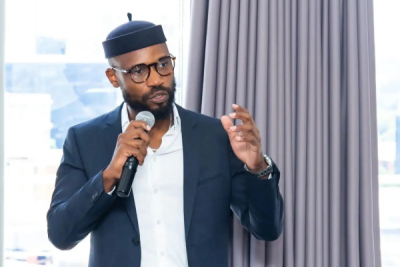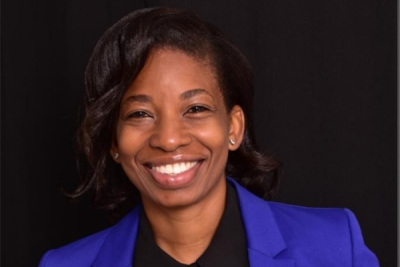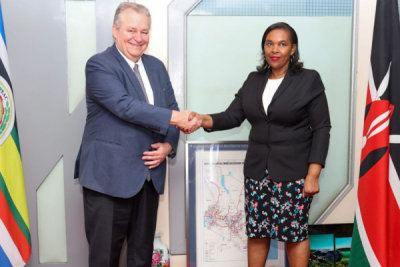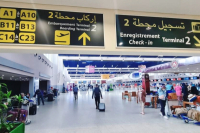To support digital transformation, the authorities have launched the "Congo Digital 2025" strategy. This plan includes various programs and projects backed by multiple technical and financial partners.
Congo’s Minister of Posts and Telecommunications Léon Juste Ibombo, on Wednesday, unveiled several initiatives during a ceremony where computer equipment was donated to Marien Ngouabi University.
“A few months ago, we initiated the connectivity of the two major universities in our country, Marien Ngouabi University and Denis Sassou Nguesso University. The work is currently underway, and completion is expected by the end of this year,” Ibombo stated.
In addition to the university connectivity project, he highlighted the training of 1,200 young people in digital skills, funded by a $1 million World Bank grant, and the installation of high-speed free Wi-Fi on the Marien Ngouabi University campus.
These initiatives are part of the Digital Transformation Acceleration Project (PATN), aligned with the national "Congo Digital 2025" strategy. Supported by $100 million from the World Bank, the project aims to provide high-speed internet access to public administrations, universities, secondary schools, and rural areas.
Improving connectivity for academic institutions will help modernize the country’s infrastructure, facilitate access to online services and e-learning, and enhance young people’s digital skills, ultimately strengthening Congo’s competitiveness in the ICT sector.
Adoni Conrad Quenum
The government is stepping up efforts to accelerate digital transformation across all sectors of the country. These initiatives are receiving substantial support from the United Nations, further strengthening the implementation of strategic projects.
The Malawian Parliament introduced a new digital system, the e-Chamber, on Thursday. Designed to revolutionize internal operations, the system aims to increase efficiency and transparency through digitized parliamentary processes.
A training session was held on September 11 to prepare members of parliament for the transition to the new technological environment. The institution stated, "The complete system will be fully operational for the next parliamentary session. This training underscores our commitment to embracing digital tools and improving procedural efficiency to better serve the Malawian people."
The e-Chamber system offers advanced features, including audio management, electronic document handling, and electronic voting. Each parliamentarian will receive a tablet equipped with a new audio system, facilitating access to necessary documents and official tasks.
This initiative is part of a broader digital transformation undertaken in partnership with the United Nations Development Programme (UNDP). It follows the introduction of the e-Court platform in April, aimed at improving access to justice for marginalized communities.
The adoption of the paperless multimedia system within Parliament will enhance operational efficiency by centralizing the management of speeches, votes, simultaneous interpretation, and member registration. With this move, Malawi joins other African countries such as Kenya, Uganda, and Angola, which have already implemented similar systems.
Samira Njoya
An entrepreneur and business leader, he runs several companies. His most recent venture is a digital startup that promotes the consumption of local meals in South Africa.
Talifhani Banks (photo) is a trained statistician and South African entrepreneur. He founded Spaza Eats, a startup launched in 2020 that specializes in delivery services. The company offers a platform for delivering food, groceries, and local products, with a unique focus on traditional South African meals and the digitization of informal markets, thereby promoting financial inclusion and access to banking services. The platform emphasizes local suppliers and traditional cuisine.
In addition to Spaza Eats, Talifhani Banks is the CEO of AnalyticsX, a tech company that provides a full suite of services, including software development, data engineering, data science, Internet of Things (IoT), system testing, and systems analysis. With operations in South Africa, Botswana, and Dubai, AnalyticsX delivers innovative solutions to help businesses thrive in an increasingly digital environment. The company is also a tech investor, supporting promising startups by providing the necessary funding and resources for growth and success.
Talifhani Banks graduated from the University of Pretoria, where he studied statistics and econometrics from 2009 to 2012. He began his professional career in 2013 at Daymon, a business services and consulting firm, working as a private label analyst. In 2015, he joined Pick n Pay, a retail startup, as a pricing and promotions analyst. By 2017, he was a business analyst at AutoZone South Africa, an automotive company.
In 2022, Talifhani Banks was recognized for his achievements, receiving several awards, including South Africa's Entrepreneur of the Year and Tech CEO of the Year. He also won the BRICS International Award of the Year.
Melchior Koba
The lack of timely agricultural information has long impacted farmers' productivity and income. To address this issue, she developed an information system based on artificial intelligence.
Cassandra Mtine (photo) is a Zambian entrepreneur, co-founder, and CEO of AgriPredict. Founded in 2016, this agri-tech startup helps small-scale farmers access on-demand agricultural information.
Based in Lusaka, Zambia, AgriPredict uses artificial intelligence and machine learning to provide farmers with weather data such as rainfall forecasts, temperature trends, and humidity levels. Accessible via USSD and a mobile app, this information helps farmers better plan their activities.
“Our AI-based weather app is more than just a tool; it's a bridge between cutting-edge technology and traditional farming practices. We believe that by putting this power into the hands of farmers, we're contributing to a more food-secure future,” said Cassandra Mtine in August 2024.
AgriPredict also offers an early warning system that alerts users to potential threats like severe weather, diseases, or pest infestations. Additionally, the startup has developed an online marketplace that facilitates the buying and selling of products, connecting farmers with buyers, sellers, and agricultural traders.
Cassandra Mtine graduated from the University of Arizona in the United States, where she earned a bachelor’s degree in environmental economics and natural resources in 2004, followed by a master’s degree in public policy and administration in 2007. She began her professional career in 2008 at the Critical Path Institute, a nonprofit focused on drug development, where she served as an associate project manager.
From 2012 to 2017, she was CEO of Shopzed Investments, an online grocery delivery service. In 2013, she also worked as a consultant for the Centre for Environment Justice, an organization advocating for the fundamental right to a healthy environment and access to accurate environmental information.
Melchior Koba
The Kenyan government is seeking international partners to bolster its digital transformation efforts. In June, a partnership with Malaysia was established towards this goal.
Kenya and Belgium are exploring potential collaborations in the digital sector. Margaret Ndung’u (photo, right), Kenya’s Minister of Information, Communications, and Digital Economy, met with Peter Maddens (photo, left), Belgium’s ambassador to Kenya, on Wednesday to discuss potential areas of partnership.
While specific details were not disclosed, the ministry indicated that the talks covered last-mile connectivity and other digital initiatives. The discussions come as Kenya actively seeks international support for its digital transformation.
In June, Kenya engaged in talks with Malaysia on cybersecurity and semiconductor production. In January, the Indian government approved a memorandum of understanding with Kenya focusing on the digital space.
International collaboration is expected to play a crucial role in advancing Kenya’s digital economy acceleration program. Since taking office, President William Ruto has made clear his ambition to leverage digital technology for socio-economic development by 2027. His plans include significant investments in infrastructure, such as deploying 100,000 kilometers of fiber optic cable, setting up 25,000 Wi-Fi access points, and digitizing 5,000 administrative services.
Isaac K. Kassouwi
AI adoption has the potential to increase productivity and create jobs, especially in tech. By investing in AI infrastructure and promoting collaborations between the public and private sectors, Nigeria aims to position itself as an AI leader in Africa.
In partnership with Google, the Nigerian government has launched a ₦100 million ($59,500) fund to support 10 startups leveraging Artificial Intelligence (AI) in their technology solutions. The initiative was announced on September 10, 2024, by Dr. Bosun Tijani, Minister of Communications, Innovation, and Digital Economy at the 2-day ‘Global Inclusivity and AI: Africa Conference’ in Lagos.
Today, we launched the N100million Artificial Intelligence Fund in collaboration with @googleafrica aimed at supporting Nigerian startups leveraging AI to build innovative solutions.
— Dr. 'Bosun Tijani (@bosuntijani) September 10, 2024
The AI Fund, which will be coordinated by @NCAIRNigeria, is a critical step in taking advantage… pic.twitter.com/pKyuz6SFhJ
Dr. Tijani emphasized the government's role in shaping AI policies that can influence both public and private sectors, stating, "If we get it right in the public sector, it will permeate the private sector and shape the future of things in our country."
The National Centre for Artificial Intelligence and Robotics (NCAIR) will coordinate the fund as part of the government's broader push to position Nigeria as a leader in AI technology.
Google's involvement in the fund reflects its commitment to Africa's digital future. In addition to the funding, the selected startups will gain access to Google's AI tools, mentorship, and a global network of experts.
Startups eligible for this funding must have at least one Nigerian founder and be focused on AI solutions with scalable potential. The application period will run from September 10 to September 25, with recipients announced in October.
This initiative is expected to accelerate AI adoption in Nigeria and further cement the country's position as a key player in Africa's digital economy. It aligns with broader strategies outlined in the country’s National Artificial Intelligence Strategy (NAIS).
Additionally, the 3 Million Technical Talent (3MTT) program, an initiative of the Federal Ministry of Communications, Innovation, and Digital Economy, complements these efforts by focusing on building a skilled workforce in tech and AI. This aligns well with the AI fund, which targets startups with high-impact potential, as seen in the recent partnerships between Google and Nigeria.
According to multinational accounting firm PricewaterhouseCoopers International Limited (PwC), AI could add up to $15.7 trillion to the global economy by 2030, with Africa benefiting from increased efficiencies and new business opportunities.
Hikmatu Bilali
Establishing innovation hubs and fostering tech education drives entrepreneurship by empowering individuals to create localized solutions to pressing challenges. This approach enables African nations to develop indigenous technologies in sectors such as agriculture, healthcare, and education, decreasing their dependence on foreign innovations.
The Rwandan government, led by Prime Minister Dr. Edouard Ngirente, has inaugurated the construction phase of the Kigali Innovation City (KIC), a major initiative aimed at advancing technological innovation in Rwanda. The groundbreaking ceremony took place on September 10 in Kigali’s Special Economic Zone, Gasabo District.
"Kigali Innovation City is more than just infrastructure; it is an ecosystem designed to promote innovation, attract top talent, and drive investment," Dr. Ngirente emphasized. He added that KIC aligns with Rwanda's vision of a prosperous, tech-driven future for the nation and the African continent.
Rwanda’s ICT and Innovation Minister, Paula Ingabire Musoni, underscored the importance of KIC as a catalyst for tech investment. She described KIC as a platform where multinational companies and startups can collaborate on solutions that will shape Rwanda's future technology agenda.
The KIC project, a 61-hectare smart city worth over $ 2 billion, is a master-planned city designed to create a hub for technological innovation. It will include universities, startup incubators, office spaces, and supporting facilities such as retail and hospitality services. Pioneering Infrastructure investor and asset manager Africas50, backed by African global capital, was granted exclusive rights by the Rwandan Government to develop, operate, and commercialize the city.
The project is expected to generate $150 million in annual ICT exports and attract over $300 million in foreign direct investment. The city is also projected to create more than 50,000 jobs upon completion and produce over 2,600 tech graduates annually, bolstering Rwanda's tech ecosystem.
This initiative aligns with government-led programs like the Smart Rwanda Master Plan, which aims to transform the nation into a knowledge-driven economy, and the One Laptop Per Child initiative designed to empower the population with digital literacy. By increasing digital proficiency, Rwanda can enhance the workforce available to innovation hubs like Kigali Innovation City (KIC), encouraging entrepreneurship and the creation of technology solutions that address African challenges. In the long run, this will cultivate a thriving innovation ecosystem, strengthen Rwanda's position as a continental tech leader, and contribute to bridging the digital divide, fostering sustainable growth, and advancing Africa’s global technological presence.
The ICT sector in Rwanda has grown steadily over the years. According to the Rwanda Development Bank’s ICT Skills Snapshot 2022, the sector contributed 2% of GDP and employed around 8,962 workers (0.26% of employment) as of 2020. The government targets a higher contribution through its Digital Transformation Strategy and projects like KIC.
Hikmatu Bilali
To boost its economic growth and enhance its international visibility, Morocco is betting on the development of tourism. In this context, the country is investing in the modernization of its airports, which serve as key gateways to its territory.
The National Airports Authority (ONDA) has launched a strategy called "Décollage 2025," with a key focus on digital transformation, to create a seamless digital experience for travelers by 2025. This initiative was announced by Mohammed Abdeljalil, the Minister of Transport and Logistics.
"The Office has allocated substantial funds for the digital transformation, hiring specialized technical experts to manage its Digital Factory unit. This unit will oversee the implementation of projects aimed at bolstering the digital transformation of the Office across all its activities," explained the minister.
One of the first steps in this plan is the installation of "e-gate" smart portals at Moroccan airports. These automated systems use biometric technology to verify travelers' identities. The self-service devices allow passengers to pass through immigration without an agent, speeding up both boarding and disembarking processes.
The new terminal at Rabat-Salé Airport, set to open in 2025, will serve as a pilot project before the initiative is extended to other major airports, such as Mohammed V and Marrakech-Menara. The strategy also includes implementing a "SMART AIRPORT" information system that will provide real-time monitoring of airport facilities and collect data to enable quick responses in case of operational issues.
These initiatives aim to modernize Morocco’s airport infrastructure ahead of major events like the Africa Cup of Nations next year and the 2030 FIFA World Cup, which Morocco will co-host with Spain and Portugal. The improvements will enhance the travel experience and streamline data coordination.
By integrating e-gates, Morocco is following in the footsteps of many European countries that have successfully adopted this technology. This system marks a significant step toward the digitization of airport services, providing travelers with a more efficient experience while boosting security.
Samira Njoya
Due to a lack of information about patients' medical histories, doctors often find it difficult to provide appropriate care, which can lead to dramatic situations. To address this situation in Côte d'Ivoire, she set up a dedicated system.
Corine Maurice Ouattara (photo) is an Ivorian expert in digital health and an entrepreneur. She is the founder and CEO of Pass Santé Mousso, a company specializing in digital health solutions.
Founded in 2016, Pass Santé Mousso offers a digital medical record system that allows patients to store all their medical and personal information in one place, accessible at any time via a web and mobile application. It also includes physical tools such as a bracelet, medallion, and card to facilitate access to medical information in case of emergencies.
Pass Santé Mousso’s mission is to “address the growing challenges of managing medical data and improve the quality of care, particularly in emergency situations. Our goal is to make healthcare more accessible and personalized through advanced digital solutions,” as stated on the company’s LinkedIn page.
The idea for Pass Santé Mousso emerged after a series of tragic events. Having suffered from recurring medical crises, Corine Maurice Ouattara once found herself in a hospital where, due to a lack of information, a doctor gave her the wrong treatment, leaving her bedridden for two days. In 2014, a young girl who had been assaulted in Côte d'Ivoire died because of inadequate care, which was partly due to the absence of medical information. These incidents motivated Ouattara to launch this project to prevent such situations from happening again.
Corine Maurice Ouattara also serves as the president of the Digital Health Association in Côte d'Ivoire, an organization dedicated to developing digital health solutions in the country.
She holds a degree in health information systems management from the National Institute of Health Training in Côte d'Ivoire, along with a law degree from the University of Abidjan. Before venturing into entrepreneurship, she worked as a personnel management officer at Etipack-CI, a company specializing in packaging and containers, from 2005 to 2006.
With Pass Santé Mousso, Ouattara has won numerous awards. She secured second place at the Ivorian TECHMOUSSO competition in 2016, third place at the Orange Entrepreneur Social contest in 2018, and was named a laureate of the Outstanding Young Person Award 2018 (TOYP) by the Junior Chamber International of Côte d'Ivoire. Also in 2018, she won second place in the health start-up Awards CASES.
Melchior Koba
In 2023, the United Nations Development Programme (UNDP) initiated a pilot project to train young people from 24 African countries in cybersecurity. The success of this initial phase has led to the launch of a larger initiative aimed at expanding the program.
The West and Central Africa Regional Bureau of the United Nations Development Programme (UNDP) announced Monday, its commitment to training 25,000 young people in cybersecurity across both subregions. To achieve this goal, the UNDP has partnered with Canada's Concordia University and the digital skills academy Give1Project. The training will last five months and will culminate in a certification.
The initiative follows the success of a 2023 pilot phase, which provided a four-month cybersecurity training program for youths from 24 African countries, including two weeks of in-person sessions in Saly, Senegal. According to the International Telecommunication Union (ITU), Africa faces a shortage of 100,000 qualified cybersecurity professionals.
In recent years, cybersecurity has become one of the most critical sectors in Africa’s tech landscape. With the continent's digital market expected to reach $712 billion by 2050, the ITU estimates that Africa’s lack of cybersecurity readiness costs its member states an average of 10% of their GDP. Beyond investing in local talent, African countries must also establish robust legal and regulatory frameworks to address cybersecurity challenges.
Adoni Conrad Quenum
More...
In recent years, fintech has rapidly grown across Africa. In Cameroon, Site Antipas is a leading figure in this new wave of tech entrepreneurs shaping this segment.
Site Antipas (photo) is a Cameroonian computer engineer and tech entrepreneur, co-founder, and CEO of fintech startup Noupia.
Founded in 2020, Noupia offers Cameroonians a seamless way to create and manage virtual credit cards, enabling users to make online purchases and send and receive money. Compatible with Apple and Google Pay, these virtual cards, which can be topped up via Mobile Money, are widely used for paying for services like Netflix subscriptions, and Facebook ads.
Noupia also simplifies bill payments in Cameroon, covering services like electricity, water, and Canal+, and allows users to purchase phone credit. Additionally, through its Noupia Actu feature, users can stay updated on financial news. The startup provides other services as well, including Ixtina, a digital platform where Cameroonians can offer various services.
Apart from his role at Noupia, Site Antipas is the lead web developer for First Hair, a company specializing in hair care products. He developed the company's e-commerce platform, facilitating online sales and deliveries of their products.
A graduate of HIBMAT University in Buea, Site Antipas earned his degree in computer engineering in 2016. He began his career in 2015 as a full-stack freelance developer and worked as a web developer for the Catholic University Institute of Buea from 2018 to 2022.
Melchior Koba
The Namibian government has made digital transformation a cornerstone of its socioeconomic development. To ensure the security of individuals and systems, the administration plans to implement robust safeguards.
amibia is on the verge of implementing regulatory frameworks for cybersecurity and data protection. Minister of Information and Communication Technology (ICT) Emma Theofelus announced on Monday, September 9, that two draft laws are nearing completion.
Speaking at the launch of the eighth National ICT Summit, Theofelus stressed the importance of these laws in a rapidly evolving digital landscape. "To thrive in this new era, we must not only adapt to technological changes but also build a resilient framework capable of keeping pace with advancements," she stated.
The cybersecurity and data protection laws are part of the National Digital Strategic Plan for 2025-2029. Their development comes amid a fast-paced digital transformation, marked by the rapid adoption and diversification of ICT usage. For instance, mobile internet subscriptions in Namibia rose from 934,000 in Q2 2016 to 1.532 million in Q2 2024, a 64.1% increase. By the end of June, the number of mobile subscribers had reached 2.47 million.
This rapid growth in digital adoption brings new challenges, particularly the rising threat of cybercrime. According to Interpol’s "African Cyberthreat Assessment Report 2024," cybercriminals are using increasingly sophisticated methods to exploit vulnerabilities in individuals, organizations, and states.
Strengthening cybersecurity and personal data protection is essential to achieving the Namibian government’s digitalization ambitions. The government aims to leverage digital technologies to drive economic growth, promote social inclusion, and foster overall societal progress.
“From e-government to digital health and education, these technologies offer new ways to enhance service delivery and improve the quality of life for our population. We must harness these technologies to make government services more accessible, efficient, and responsive to citizens' needs,” added Emma Theofelus.
Isaac K. Kassouwi
Digital transformation, particularly in healthcare, is crucial for development. Implementing Digital Health Systems is expected to improve access to medical care and reduce inefficiencies. By tracking pharmaceuticals using digital tools and AI, the government can better manage resources and ensure that essential medicines reach patients, thereby improving public health outcomes.
Zambia has begun rolling out Digital Health Systems in hospitals nationwide to enhance healthcare delivery and ensure the availability of essential medicines. The project was announced on September 4 by the Ministry of Science and Technology. In collaboration with the Ministry of Health, it aims to digitize healthcare services and combat drug pilferage.
At the launch of the project in Gwembe, Southern Province, Minister of Science and Technology Felix Mutati highlighted the role of modern technology in transforming healthcare. He noted that hospitals would now use digital tools to extend healthcare access to more Zambians. Additionally, the system will track pharmaceuticals from procurement to patient use, aiming to curb drug theft in healthcare facilities.
Access to basic healthcare services in Zambia is unevenly distributed between provinces and between urban and rural areas. According to the International Insulin Foundation report on Zambia’s Health System, in urban regions, 99% of households are located within 5 kilometers of a health facility, whereas in rural areas, only about 50% of households have similar proximity to healthcare facilities. The digitization initiative aims to bridge this gap by utilizing digital tools to reach more citizens, especially in underserved rural regions
Meanwhile, drug theft has been a longstanding issue in the Zambian health sector whose national drug stock level was 53.1%, below the World Health Organization’s minimum threshold of 70%. Transparency International highlighted the concerns in 2020 when Zambian journalists uncovered irregularities in a US$17 million health kit procurement. By digitizing health services and leveraging AI technologies, the government improves accountability in the pharmaceutical supply chain, ensuring drugs are tracked from procurement to patient use, ultimately boosting transparency and curbing mismanagement.
This move aligns with Zambia’s ‘Health Information Systems Strategy 2022 – 2026’ vision of “a national health information system that harnesses digital innovations to support evidence-based decision making for quality and equitable health services.”
Hikmatu Bilali
Morocco is facing a persistent problem of school dropouts, particularly in rural areas. Efforts are underway to reverse this growing trend.
Orange Maroc Foundation announced on Thursday plans to equip 55 new schools with computer equipment for the 2024-2025 school year as part of its "Digital Schools" program. The announcement came during the launch of the project's second phase.
“This program aims to democratize access to digital technologies in rural primary schools, ensuring equal learning conditions for all students, regardless of their environment. Strengthening our partnership with the Ministry of National Education is further proof of our commitment to supporting the Kingdom in the successful digital transformation of Moroccan schools,” said Hind Lfal (photo), Secretary General of Orange Maroc.
Launched in 2022 in partnership with the Ministry of National Education, the project provides digital equipment, including computers for teachers, tablets for students, and online educational resources. It aims to enhance learning in rural areas, which often face challenges in accessing modern educational tools.
This initiative aligns with Orange Maroc's corporate social responsibility strategy to promote digital inclusion and combat school dropouts. According to the Moroccan Ministry of National Education, 249,458 students dropped out of school in 2022/2023, with 45.5% coming from rural areas. UNESCO estimates the economic impact of this issue in Morocco at $196 million annually.
With this new phase, 55 additional schools will be equipped, 200 teachers will receive training, and 17,000 students will benefit from the initiative. Since its launch, the program has already digitized 16 rural schools, benefiting over 4,000 students and 30 teachers.
Samira Njoya


